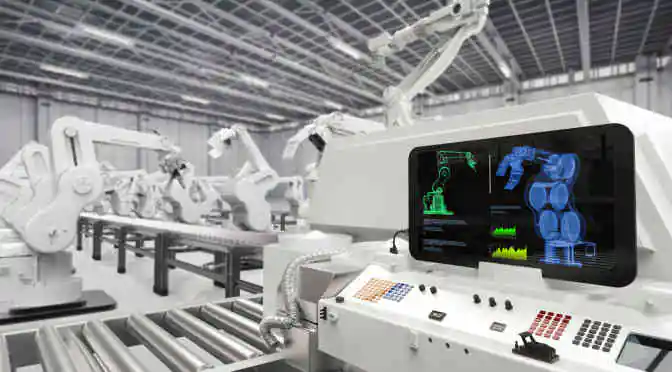The manufacturing industry is evolving. New business models and massive digital transformation efforts are putting the former on the verge of an innovative phase that promises greater productivity, efficiency and lower costs. Unsurprisingly, the vast benefits that these digital innovations deliver make it crucial for manufacturers today to adopt emerging technologies in order to thrive in the disruptive future. The race to digital transformation is on!
 In 2018, the following top 5 emerging digital transformation technologies will dominate:
In 2018, the following top 5 emerging digital transformation technologies will dominate:
1) Internet of Things: The dawn of digital disruption
The Internet of Things (IoT) needs no introduction. This technology is everywhere, and the manufacturing sector is the leading market where Industrial IoT (IIoT) is significantly embraced and where most IoT investments are made. Companies like Bosch, Siemens, FCA, Harley-Davidson, GE, General Mills and Cisco have already embraced IoT in their manufacturing plants. The IoT’s integration in manufacturing is having a significant impact on more than just productivity. Factory workers, who once crowded assembly lines in droves, have significantly been replaced over time by connected and automated machines.
Just like other IoT-related technologies, the efforts to integrate manufacturing with the current explosion in internet-connected devices eventually comes down to putting valuable data to work.
2) Smarter manufacturing with artificial intelligence
Automation has consistently evolved over the past few years, helping manufacturers power and manage multiple tasks simultaneously. Artificial intelligence (AI) has been the driving force behind the new era of industrial automation, where processes are being restructured to make production decisions efficient, smarter and in real-time. Although it is just now finding its niche in the manufacturing sector, several recent developments are allowing AI to cross into the mainstream.
As technology matures, cost drops, and manufacturers discover applications for which machine learning algorithms can make complex decisions. Thus, the future of AI in manufacturing is becoming more feasible in emerging markets.
3) Robots are driving change
Since the 1960s when they were first installed in automotive plants, robots have become commonplace in industries such as semiconductor, automotive, rubber, plastic processing and many others. These take on roles that could only be carried out by human workers previously. Today, industrial robots are on the verge of revolutionizing manufacturing with capabilities that mimic human traits like memory and dexterity, which makes them more effective in industries like manufacturing. Robotics has become integral in improving efficiency and speed, allowing manufacturers to optimize production, inventory, workflow and value chain decisions.
4) Data analytics
From retail and healthcare to government and financial services, big data analytics has applications in just about every industry. Manufacturing companies are fast realizing that big data and analytics can help enormously in improving business processes and operational efficiencies. Applying advanced analytics to a manufacturer’s data can yield insights that could help the company optimize the productivity of individual assets, and also, assist in tracking the total manufacturing operation.
The urgency to adopt big data analytics is higher than ever today. A failure in ramping up the usage of big data and predictive analytics will leave manufacturers struggling to remain competitive. Consequently, these companies will not be able to deliver orders on time.
5) Additive manufacturing is all the rage
Additive manufacturing (AM), colloquially known as 3D printing, has grown steadily from its humble beginning as a plastic prototyping process to a technology that impacts almost every segment of the manufacturing ecosystem. The concept made great strides in 2017, with new applications being discovered, new technologies coming to the market and innovative 3D printing materials being developed.
Top manufacturing companies are making ambitious moves to capture their share of AM’s potentially huge value. For instance, Hewlett-Packard (HP) developed its own polymer-based AM process. Also, GE, BMW, Nikon, and Google are collectively funding a Silicon Valley startup’s endeavor to develop new polymer-based AM technology.



